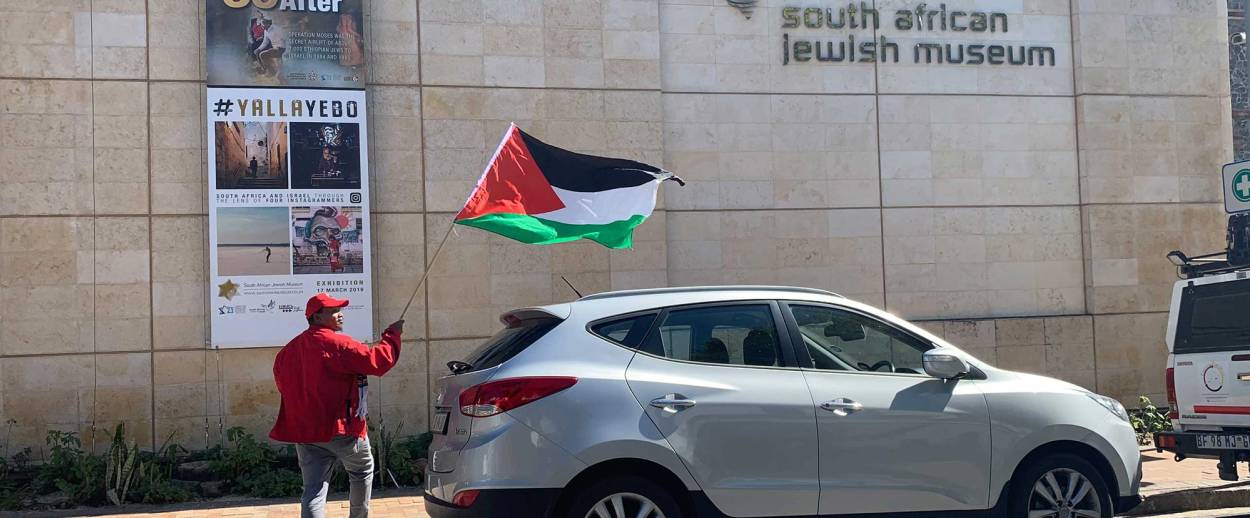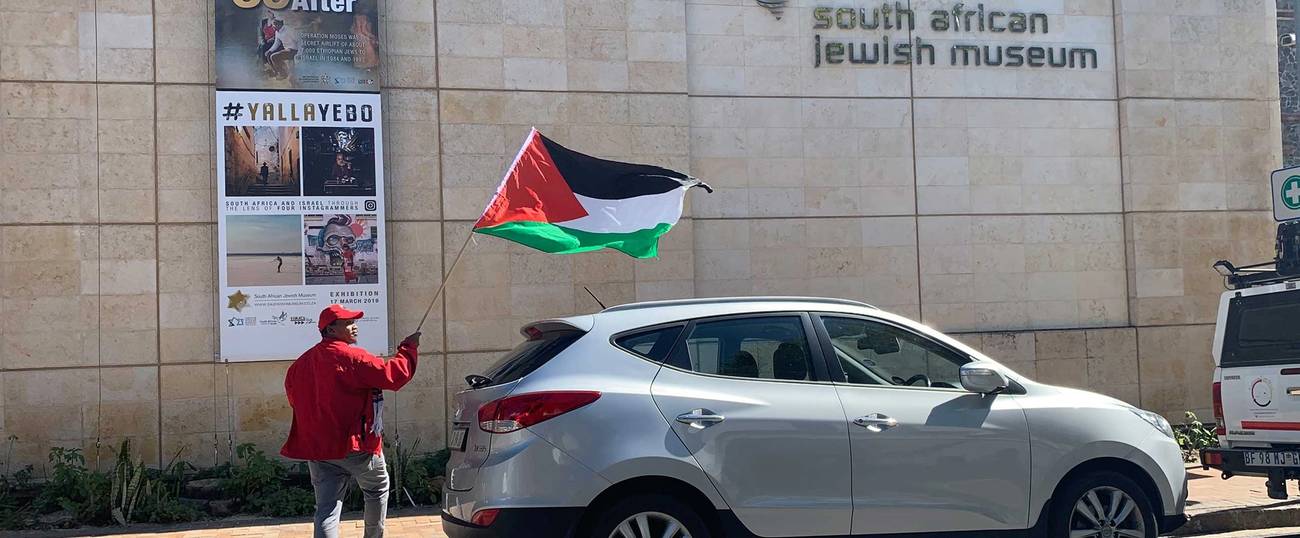Picketing Cape Town’s Jewish Groups in the Name of Palestinians
In South Africa, protests supposedly aimed at Israel target the country’s Jewish institutions




On Friday morning, the Council of South African Trade Unions picketed the Cape Town offices of the Jewish Board of Deputies as part of the country’s annual Israel Apartheid Week festivities. Why target the board, whose mission is to “promote the safety and welfare of South African Jewry” and “build bridges of friendship and understanding between Jews and the broader South African population?” Malvern De Bruyn , a COSATU activist, touched on that question during a brief address to the 30 or so activists on hand, most of whom wore shirts or hats representing COSATU, the ruling African National Congress, and the South African Communist Party: “There’s no embassy in Cape Town. That’s why we came to the board of deputies.” In the absence of an Israeli target, the provincial chapter of COSATU chose the most visible and convenient Jewish one.
COSATU, one of the catalysts for the fall of apartheid regime, comprises one-third of the so-called tripartite alliance of 1990 that forms the ruling African National Congress. The other two members are the communist party and the ANC itself, but the communists and COSATU don’t stand in elections and have their interests represented through the ANC instead. Among those governed by the ruling ANC are the roughly 15,000 Jews in Cape Town. Their institutions, including the South African Jewish Museum, are located in the center of the historic city, not far from Parliament, and just a block form the present-day botanical garden where, 300-odd years ago, the Dutch East India Company kept vegetable patches used for reprovisioning passing ships. Beginning in the mid-1800s, the city’s Jews carved out an unlikely position of prominence despite being a microscopic minority in a society that operated around strict and violently enforced racial hierarchies—the kind of environment in which Jews have had very mixed luck over the centuries. COSATU, meanwhile, is a nationwide political powerhouse legitimized through its role in the freedom struggle and its membership in the nation’s leading institution.
The protests took place in Cape Town’s scenic Gardens neighborhood beneath foamy white clouds and the looming summit of the Table Mountain. As late morning sunlight glinted off the palm fronds on the charming narrow streets, the picketers in attendance assured me they were just there to talk and that their demands were eminently reasonable. Even the guy wearing the “Stop the Holocaust of Palestinians” T-shirt, with the word “holocaust” written in red beneath an image of a Palestinian flag dripping blood, would tell you he had nothing against Jews. Paul Bester, the burly and voluble leader of COSATU in Western Cape province, noted that during apartheid, “not all white people were racist”—indeed, some had fought the system, and paid dearly for their activism. So, in a sense, COSATU was on hand to find out whether the Jews were similarly redeemable. “We think that not all Jews support the atrocities,” he said, referring to various Zionist-attributed horrors. “We are calling on them to stand in solidarity.” The idea of the picketing, he continued, was to ask, “As Jews, do you support us or do you believe in Zionism? We don’t want to fight them. This is not a declaration of war.”
In a narrower sense, the goal of the gathering was to deliver a “memorandum” to the board. Later in the protest, Andile Ngqaneka, COSATU’s provincial deputy chairperson, said that the group planned to picket the board every month until a “response” was received—although he later clarified to me, “if the response is not what we want will continue the protest, until they heed the call.”
The memo accuses Israel of “genocide of the Palestinian people,” and characterized the conditions of Palestinians as “much worse” than that of black South Africans under apartheid. It softly accuses the board of being essentially an alien or even traitorous body: “Your unconditional active support for the Israeli regime and its atrocities makes a mockery of South Africa’s constitutional democracy.” It dabbles in what could be described as light blood libel: “We also remember that the G3 semi-automatic rifles used at the Marikana massacre in 2012 [in which dozens of striking mine workers were killed] were of Israeli origin, albeit manufactured in South Africa.” COSATU “demand[s] that the SAJBD does the right thing and adheres to the SA Constitution by,” among other things “immediately ending its support to Israel” and endorsing a one-state solution and the BDS movement. In sum, the representative of South Africa’s Jews must abandon Zionism and embrace the dissolution of Israel or face the wrath of one very important constituent part of their own country’s ruling political institution. What positions had the board taken to bring down this reckoning, I wondered, and asked Ngqaneka whether he knew of any examples of the organization supporting Israel. “Not at this juncture,” he told me.
Still, other attendees seemed to believe the board had an ability to shape Israeli policy. ”The board of deputies must tell Israel to give back the land of Palestine,” De Bruyn said. “They should take the memorandum and give it to Israel.” Had COSATU ever picketed a church or a mosque, I wondered? “If a church or mosque was oppressing people or supported a country oppressing people, we’d do the same.” As of yet, however, “We’ve never been given a reason to do so,” he said.
During the protest itself, a dozen or so demonstrators—a few of them wearing “hands off Venezuela” T-shirts, and one of them sporting a shirt depicting a meeting between Nelson Mandela and Fidel Castro—sang protest songs from the apartheid era. At some point, De Bruyn took the microphone. “We’re going to march from here to the police,” he pointed to a row of cops standing outside the board’s offices, which were totally empty that morning. “The shortest march in the history of COSATU!” Ngqaneka ceremoniously slid the memo under a metal roll-gate. The energy hadn’t quite dissipated, so a dozen or so of the demonstrators crossed the street. Thus a march on the board of deputies briefly became a march on the South African Jewish Museum, which was similarly closed. The marchers gathered under the museum’s sign for a photo and the obligatory “Free Palestine” chant.
For COSATU, this was all normative politics: The street drama, the callback to the organization’s roots in the liberation struggle, the ultimatum thinly masked as an honest plea for dialogue. A Jewish target could be seamlessly transformed into a proxy for the government of Israel and just as easily slotted into the kind of political performance that COSATU has repeated on countless other issues, on countless other occasions. In the course of business as usual, COSATU had stumbled into an obscenity without seeming to realize or even intend it.
Before the protest began I spoke to a man from COSATU security who introduced himself as Elton and kindly offered me a Coke. “I don’t know what this protest is about,” he told me at the advertised start time of 10 a.m., at which point almost no one had shown up yet, aside from a local television crew. “We’re expecting 500 people.” In fact, he then realized, the protest was about “jobs in South Africa, about the poverty, about people not getting basics, about economic difficulties in the country, how fucked up the political system is, everything!” They were demonstrating here, he said, “because it’s close to Parliament.” In South Africa, where the distance between the opulence of central Cape Town and the squalor of a teeming squatters camp is always far shorter than it might seem, the choice of things to protest is virtually limitless and the targets are seldom that far away or hard to identify. And yet here we were.
***
Like this article? Sign up for our Daily Digest to get Tablet magazine’s new content in your inbox each morning.
Armin Rosen is a staff writer for Tablet Magazine.